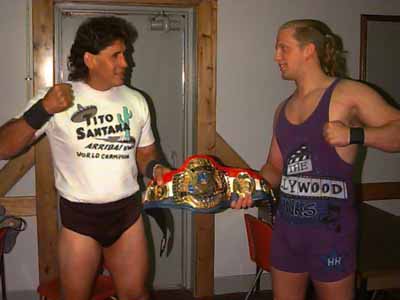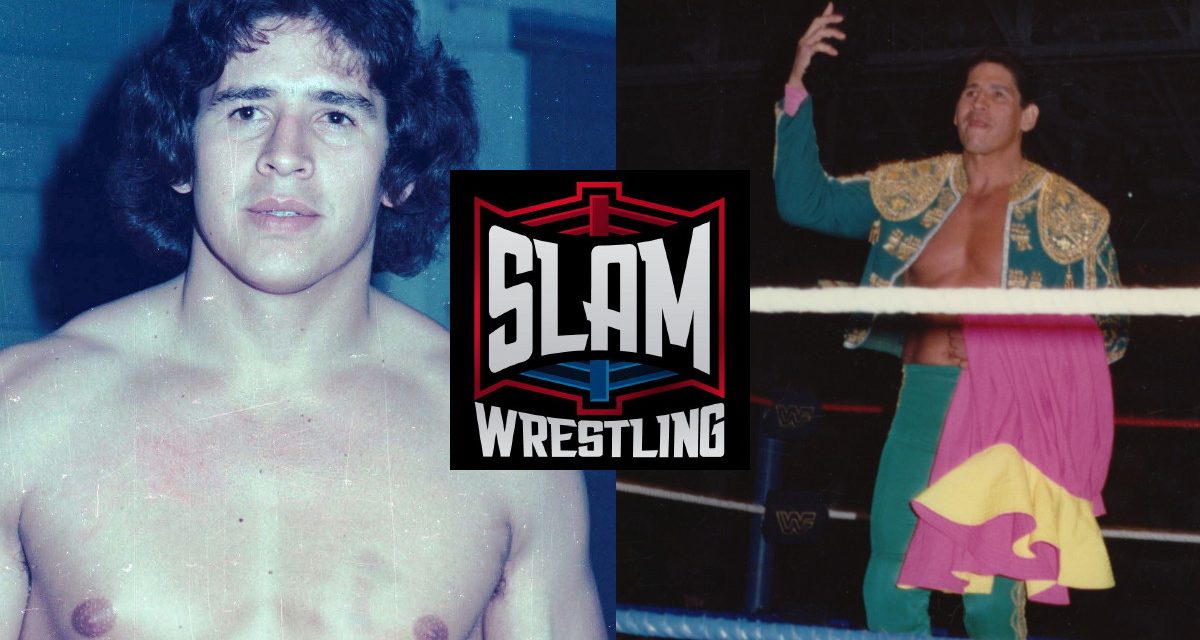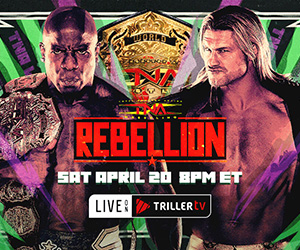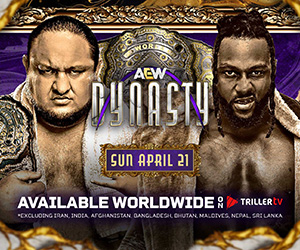This night, Tito Santana is sitting in a dressing room in Cambridge, Ontario, surrounded by wrestlers twenty years his junior.
He’s booked with the Renegade Wrestling Alliance for the weekend and gets in the ring with the household names of Stunning Sean, Pete Rokk and Jamie Jackson.
It’s a long way from wrestling’s glory days in the late eighties, but it doesn’t bother Santana.

Tito Santana wrestles the RWA title away from then-champ Stunning Sean. Santana won the title Friday night in Cambridge and lost it to Pete Rokk on Saturday.
“I enjoy working the independents. You get closer to the fans,” he tells Slam Wrestling in the RWA dressing room.
“I’ve been doing it so long. Plus it keeps you in shape, keeps me working out. I work out as much as I ever have.”
Santana only dons the tights a half dozen times a month, maybe 50 times a year.
He’s 45 now, but doesn’t really look it. He still has a full head of hair, wears glasses outside the ring, and keeps in good shape. In conversation, Santana is quiet and takes a bit of time to think about a question before offering an answer.
Besides the occasion wrestling match, he keeps busy with his family, a hairstyling salon he co-owns with his wife, watching the stock market, and teaching and coaching football at a local high school.
“This business has been great to me. I gave up, I sacrificed a lot. But because I may sacrifices, I’m able to enjoy my life, I don’t have to work much anymore. My kids — my oldest one’s 15, the youngest one’s 11 — Since 1993, when I left the WWF, I’ve been home 95% of the time whereas before I was away 95% of the time. So I’m a father and a husband now.”
The last time a national audience saw Santana, he was a Spanish announcer with the WWF. He did that for almost a year up until April, filling in for Hugo Savanovich, who had some legal troubles. (“He cleared his name and he’s back.”)
Of course, one has to ask about the dangers of working on the Spanish announcing table.
Santana laughs, and explains that “a lot of people ask me, why is it your table that always gets it? The reason it was our table is because they would always locate our table right in the middle of the ring. You knew that it was more than likely, because that’s the nature of the business now. Guys flying outside the ring. It is a scary sight. I remember when the Undertaker was flying over. I almost didn’t get out of the way. You’ve got a guy over 300 pounds coming in the air, full-speed ahead. Nothing’s going to hold him back. So it is scary.”
He figures that he’s still a long way from completely retiring from in-ring action.
“Jimmy Snuka is quiet a bit older than I am, and he wrestles a lot more than I do. I could probably do this for another ten years if I wanted to. I enjoy it that much.
“I know I look a lot better than Hulk does [laughing], and he’s working a lot more than I am,” Santana continues. “The competition’s a lot easier. I can go in there, I wrestle against young guys. I teach them a little bit of a lesson and hopefully the young guys learn. I think it’s a good opportunity for the young guys to go up against me even though I might beat them most of the time. It’s a great learning experience for them.”
After being encouraged to try wrestling by fellow West Texas State alumni Terry and Dory Funk Jr., Santana was trained by Hiro Matsuda, who also trained Hulk Hogan and Mr. Wonderful Paul Orndorff. He credits Orndorff as one of the wrestlers that really helped him, as the two broke into the business at about the same time and wrestled each other on many occasions. Santana also mentions Paul Jones and Randy Savage as two others that helped him learn.
“Let’s face it, in the big leagues it’s very hard to get advice from the guys above you, because everyone is competing for the number one spot. Everyone wants to claw to the top so it’s hard to get advice,” says Santana.
“I had so much confidence in my wrestling abilities that I always advised guys. Sometimes I even offered advice when it really wasn’t appreciated. And if somebody doesn’t appreciate it, I won’t offer it a second time. There’s so much to learn in this business that you need all the help you can get. With some of the guys, the problem is they get to the top too quick and never go anywhere from there but down. They go down just as fast as they went up because they get it too easy and they’re not willing to listen.”
Yet, Santana doesn’t think that it’s a bad thing when non-wrestlers like Karl Malone, Dennis Rodman, Lawrence Taylor or Kevin Greene get involved.
“I feel that it’s good for the business to have other names that are interested. There’s value enough,” he explains. “You still hear a lot of commentators, I heard a commentator when the playoffs were going on, ‘I don’t know why Malone gets involved with this garbage.’ [Bob Costas on NBC] This is not garbage. This is great family entertainment.”
Santana doesn’t believe that his sons will follow him into the sport. “When they were a little bit older, they were all gungho about becoming wrestlers. I told them one time, I said ‘would you like to be away from your kids as much as I am?’,” he says. “None of them talk about wanting to be wrestlers. … If they decide to do it, I’ll help them as much as I can. I want to see them get an education first and then go from there.”
The former Intercontinental champion and two-time WWF tag team champion Santana regrets not getting a World title run in the WWF, but understands why it didn’t happen.
“At the time, the reigning champion was Hulk Hogan. Back then, they didn’t put a good guy against a good guy. I would have loved to have wrestled Hulk Hogan.
“I wrestled Hulk Hogan in 1979 when we were both green. And I beat him one time, and he beat me one time. I was partners with him a few times. I would have loved to have had a title match against him. Because at one time my popularity was pretty high up there with him. I think people would have enjoyed a match, me against him.”
Though not interested into getting into promoting him, Santana offers some advice to independent promoters.
“A lot of small promoters that shouldn’t give up. I don’t think they should run before they crawl. Start slowly and be prepared to lose a little bit. But be persistent and run a good show. I think there’s a lot of good wrestling fans, but you’ve got to give them a good product if you expect them to come back.”
“I hope Steve [Buckley, RWA promoter] does pretty good with his promotion here, because there’s a lot of wrestling fans here. There’s a lot of young guys. I see a lot of potential in this dressing room. In order for these guys to get good, they need experience, places to wrestle in. In the independent market, it’s the promoter that’s going to go out there an hustle his butt off, deliver the posters, make sure the fans know. My advice is to get different organizations to sell tickets. Be willing to share the profits. Like Boy Scouts, or Girl Scouts or athletic programs. Do whatever you can to get people into the seats. It’s a beginning. It’s going to take a lot of hard work.”
Before ending the interview, Santana was asked to play some name association. Below are his responses:
Hulk Hogan
“When I started wrestling in 1977, Hulk Hogan used to be a fan and go and watch the matches. He loved wrestling. He got trained by the same guy that I got trained by a couple of months later. Hiro Matsuda was the guy that trained me, him, Mr. Wonderful and a bunch of other good wrestlers. For somebody as successful as he is, I feel Hulk has always kept his feet to the ground. To me, there’s a lot of guys who’ve reached a lot less success that have floated right out of the business.”
Rick Martel
“Rick Martel is a hard-working man. Can’t be trusted at all times, but he’s a hard-working man. The reason he has been successful is because of his hard work. … I don’t keep in touch with Rick.”
Bret Hart
“Bret Hart is one of the best scientific wrestlers in our business, that’s ever been around. Bret Hart was a hard worker. When I was on top of the World Wrestling Federation, Bret was just coming in, making his way up. He was frustrated many times because he wasn’t ready at the time. He stuck with it, stuck with it. He’s one of the best now.”
Greg Valentine
“Greg ‘The Hammer’ was a bull. I used to tell the guys whenever I wrestled him, I’d been in easier street fights. He’d just keep coming at you. Whenever you got done with a match against The Hammer, you were bruised. You felt bruised for days.”
Vince McMahon
“Vince McMahon is a great businessman. I feel that Vince McMahon is best thing that happened to our business. He treated wrestlers better than they had ever been treated when the expansion first started. I feel that he’s changed, but that he’s changed because a lot of wrestlers kind of stuck it to him, and he had to learn. Being in business myself, I know how sometimes employees can take advantage of you and expect too much, and just taking and taking and taking. He made guys a lot of money and they ended up burning him. He’s had to get hard. But he’s a great businessman. There’s nobody better than him.”
Terry and Dory Funk Jr.
“The Funks are the guys that got me into the business. Terry Funk and Dory Funk. They’re great people. We went to the same college, West Texas State. Terry Funk and I both played the same position, we were both tight-ends. [Laughing] Terry Funk, talking about age. He’s got some age, and the stuff that I see him do! It seems that he’s going to last forever. He won’t, but it seems that he’s going to last forever.”
Ric Flair
“The Nature Boy Ric Flair. Another guy that was a great asset to the business. He’s The Nature Boy Ric Flair. Anybody’s who’s been around him knows that Ric Flair went 24-hours a day. He lived life to the fullest, lives life to the fullest. … he’s still going I guarantee you. He’s still living an extravagant life.”
Santana on Canada
When asked about returning to London, Ontario, where he lost the WWF Intercontinental title to Greg Valentine in 1984 and hurt his knee, Santana responds:
“All of Canada has special meaning to me. I played football for the B.C. Lions and I lived in Canada for a year and a half. There’s a little Canadian in me I think. I still follow the Canadian Football League. The fans have always been great to me whenever I wrestled. It didn’t make a difference if it was the west coast, or the east coast, the fans have always treated me well.”
He loved life in British Columbia, where he played 13 games for the B.C. Lions in the CFL as a tight end.
“I was young and single and I thought it was a beautiful city, beautiful people, beautiful women. I had a great time. I lived there for a year and a half. It was a very good experience for somebody who came from way down south, a little town with 14,000 population. That was the beginning of my world tour, I guess.”
RELATED LINK



